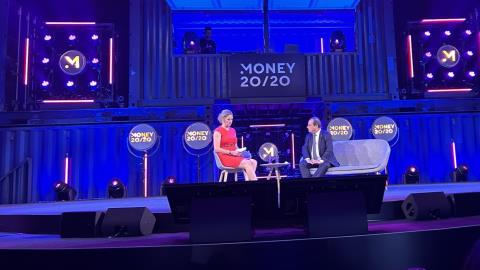The former French President, François Hollande, delivered a keynote session at Money 20/20, discussing the current landscape of technology investments in France and his efforts to establish the country as a Fintech hub.
During an interview by Money 20/20’s Scarlett Sieber, Hollande highlighted his remarkable fintech achievements while in office from 2012 to 2017. He focused on creating a conducive regulatory environment that facilitated direct lending by non-banks and simplified the process for obtaining fintech licenses, which elevated France’s status as a European fintech leader.
In response to an economic crisis, Hollande prioritized leveraging technology to address challenges faced by France and Europe at large. He stated, “The main purpose was to convince people that we have a future, and that starts by creating jobs. My policy was to demonstrate our willingness to create an ecosystem of technology. In 2013, we launched the French Tech ticket with tax incentives and established a public bank to support technological innovation and entrepreneurs. This was the first step in addressing the crisis.”
Beyond creating French Tech, Hollande initiated other measures to bolster France’s technology sector, such as offering tax breaks for early-stage investment in research and development, implementing targeted visa programs for tech entrepreneurs, and advocating for unified fintech regulation across the Eurozone.
Despite early advocacy for EU regulation, fragmentation within the continent remains a significant issue. Hollande remarked, “The problem in Europe is the fragmentation of the market. We do not have a global market for tech, which poses a major challenge. If Europe does not unite its strengths, powerful countries like the US or China will dominate the competition.”
In addition to market fragmentation, education and investment in the upcoming generation are critical factors for the domestic fintech landscape. The success of individuals often hinges on their network, making access to these opportunities vital. France boasts the world’s largest startup incubator, Station F, alongside School 42, a pioneering institution for nurturing IT talent—both of which Hollande has supported. When discussing the need to retain talent in France rather than allowing it to migrate to other fintech hubs, he stressed that the real issue isn’t talent leaving, but rather attracting them back.
“It’s not a problem to have talent abroad. The concern is how France can ensure this talent returns. Young people studying or gaining work experience in other countries is beneficial. The key question is how we can incentivize their return, not merely because they are French, but because they can thrive here.”
When asked about his proudest achievement, Hollande cited the establishment of the state investment bank. “I created a public bank to support technology and entrepreneurs. A decade later, this bank has become one of the most significant investors in tech. It no longer operates in isolation; it collaborates with other banks. Initially, the objective was to establish a player that could encourage others to invest, and now, even if the bank were to cease operations, the movement would continue.”
